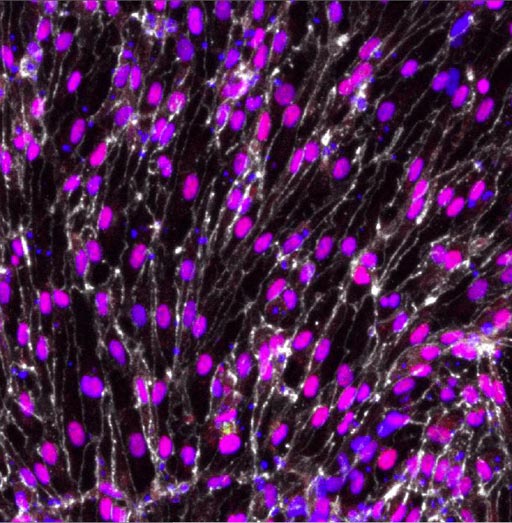Stem Cells Used to Generate Functional Arterial Endothelial Cells
By LabMedica International staff writers
Posted on 20 Jul 2017
A team of cardiovascular disease researchers developed a method for using human pluripotent stem cells to generate fully functional arterial endothelial cells, which are vital for vascular development and disease research.Posted on 20 Jul 2017
Currently, arterial endothelial cells that have been derived from human pluripotent stem cells have not been of clinical value as they have lacked the range of arterial-specific functions in vitro and the protective function for ischemic tissues in vivo.

Image: Arterial endothelial cells derived from human pluripotent stem cells express activated NOTCH1 (in red, which is an arterial endothelial cell marker) and CD144 (in white, which is a pan endothelial cell marker) (Photo courtesy of the Morgridge Institute for Research).
To advance the production of functional arterial cells, investigators at the University of Wisconsin's Morgridge Institute for Research (Madison, USA) combined single-cell RNA sequencing and CRISPR-Cas9 technology to identify pathways for regulating arterial endothelial cell differentiation. They then manipulated these pathways and generated arterial endothelial cells that demonstrated unprecedented arterial-specific functions as well as improved survival of myocardial infarction.
Single-cell RNA sequencing identified the signaling pathways - involving 40 genes of optimal relevance - critical for arterial endothelial cell differentiation. CRISPR-Cas9 gene editing technology allowed the creation of reporter cell lines to monitor arterial differentiation in real time.
The investigators reported in the July 10, 2017, online edition of the journal Proceedings of the [U.S.] National Academy of Sciences that by using these protocols they were able to produce endothelial cells from multiple human embryonic and induced pluripotent stem cell lines with gene expression profiles, oxygen consumption rates, nitric oxide production levels, shear stress responses, and TNFalpha-induced leukocyte adhesion rates characteristic of arterial endothelial cells.
"Our ultimate goal is to apply this improved cell derivation process to the formation of functional arteries that can be used in cardiovascular surgery," said senior author Dr. James Thomson, professor of cell and regenerative biology at the Morgridge Institute for Research. "This work provides valuable proof that we can eventually get a reliable source for functional arterial endothelial cells and make arteries that perform and behave like the real thing."
Related Links:
Morgridge Institute for Research













